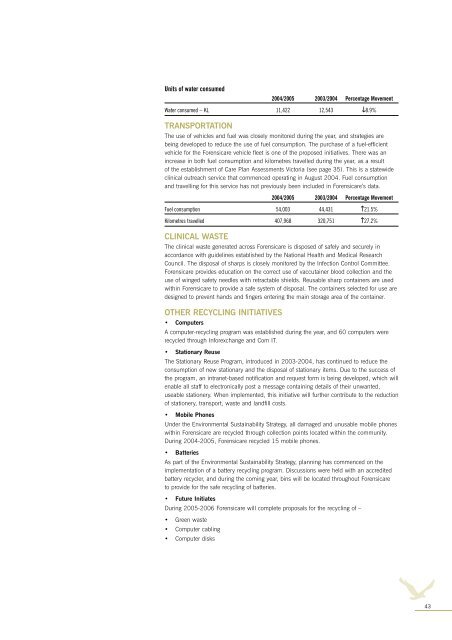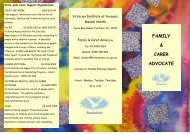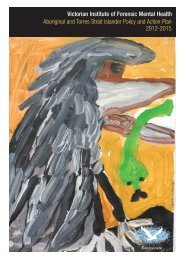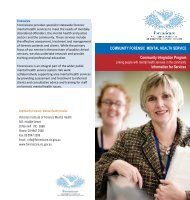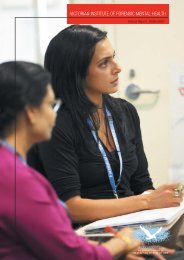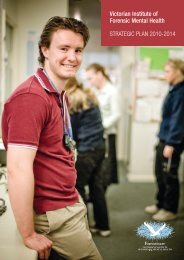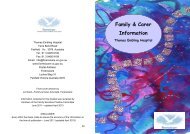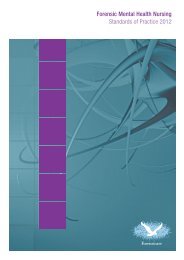Annual Report 2004-2005 - Forensicare
Annual Report 2004-2005 - Forensicare
Annual Report 2004-2005 - Forensicare
You also want an ePaper? Increase the reach of your titles
YUMPU automatically turns print PDFs into web optimized ePapers that Google loves.
Units of water consumed<br />
<strong>2004</strong>/<strong>2005</strong> 2003/<strong>2004</strong> Percentage Movement<br />
Water consumed – KL 11,422 12,543 ↓8.9%<br />
TRANSPORTATION<br />
The use of vehicles and fuel was closely monitored during the year, and strategies are<br />
being developed to reduce the use of fuel consumption. The purchase of a fuel-efficient<br />
vehicle for the <strong>Forensicare</strong> vehicle fleet is one of the proposed initiatives. There was an<br />
increase in both fuel consumption and kilometres travelled during the year, as a result<br />
of the establishment of Care Plan Assessments Victoria (see page 35). This is a statewide<br />
clinical outreach service that commenced operating in August <strong>2004</strong>. Fuel consumption<br />
and travelling for this service has not previously been included in <strong>Forensicare</strong>’s data.<br />
<strong>2004</strong>/<strong>2005</strong> 2003/<strong>2004</strong> Percentage Movement<br />
Fuel consumption 54,003 44,431 ↑21.5%<br />
Kilometres travelled 407,968 320,751 ↑27.2%<br />
CLINICAL WASTE<br />
The clinical waste generated across <strong>Forensicare</strong> is disposed of safely and securely in<br />
accordance with guidelines established by the National Health and Medical Research<br />
Council. The disposal of sharps is closely monitored by the Infection Control Committee.<br />
<strong>Forensicare</strong> provides education on the correct use of vaccutainer blood collection and the<br />
use of winged safety needles with retractable shields. Reusable sharp containers are used<br />
within <strong>Forensicare</strong> to provide a safe system of disposal. The containers selected for use are<br />
designed to prevent hands and fingers entering the main storage area of the container.<br />
OTHER RECYCLING INITIATIVES<br />
• Computers<br />
A computer-recycling program was established during the year, and 60 computers were<br />
recycled through Inforexchange and Com IT.<br />
• Stationary Reuse<br />
The Stationary Reuse Program, introduced in 2003-<strong>2004</strong>, has continued to reduce the<br />
consumption of new stationary and the disposal of stationary items. Due to the success of<br />
the program, an intranet-based notification and request form is being developed, which will<br />
enable all staff to electronically post a message containing details of their unwanted,<br />
useable stationery. When implemented, this initiative will further contribute to the reduction<br />
of stationery, transport, waste and landfill costs.<br />
• Mobile Phones<br />
Under the Environmental Sustainability Strategy, all damaged and unusable mobile phones<br />
within <strong>Forensicare</strong> are recycled through collection points located within the community.<br />
During <strong>2004</strong>-<strong>2005</strong>, <strong>Forensicare</strong> recycled 15 mobile phones.<br />
• Batteries<br />
As part of the Environmental Sustainability Strategy, planning has commenced on the<br />
implementation of a battery recycling program. Discussions were held with an accredited<br />
battery recycler, and during the coming year, bins will be located throughout <strong>Forensicare</strong><br />
to provide for the safe recycling of batteries.<br />
• Future Initiates<br />
During <strong>2005</strong>-2006 <strong>Forensicare</strong> will complete proposals for the recycling of –<br />
• Green waste<br />
• Computer cabling<br />
• Computer disks<br />
43


